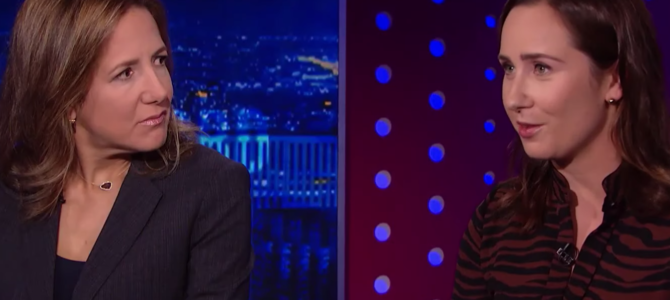New York Times reporters Robin Pogrebin and Kate Kelly told a liberal TV host that their editors at the newspaper were to blame for the failure to include the most important detail in their story announcing a supposedly new misconduct allegation against Supreme Court Justice Brett Kavanaugh. That key detail was that the alleged victim had never made a claim against Kavanaugh and had told several friends she could recall no such incident as described by the reporters. But audio evidence shows they went out of their way to leave the key detail out of a lengthy interview about the book that they recorded last Thursday.
In a friendly interview with MSNBC’s Lawrence O’Donnell last night, Pogrebin threw their editors under the bus:
Plot thickens.
Robin Pogrebin and Kate Kelly claim that the qualifier about the other alleged Kavanaugh accuser not remembering an incident at Yale was included in the initial NYT draft but removed. pic.twitter.com/p9wUTnFyM1— Chuck Ross (@ChuckRossDC) September 17, 2019
Pogrebin claimed she included the denial from the woman in a line that also named the woman. She claimed that editors took out the entire line when they removed the woman’s name. The excuse is difficult to find sufficient even if it were true, since it would be extremely odd for the reporters not to have seen the edits prior to publication. Even less-massive newspapers than the New York Times have shared editing systems as well as procedures that include a sign-off from reporters.
What’s more, in a lengthy and wide-ranging interview, the authors went out of their way to omit the key detail in response to a question. Midway through the friendly interview with NPR’s Terry Gross, she asked the authors if any other women had come forward since the Kavanaugh hearing.
Keep in mind the context. The authors spent a year desperately trying to dig up dirt on Kavanaugh and evidence in support of the claims made by his accusers. They failed on both counts, and at times admitted it, but in the epilogue they wrote that their “gut” told them to believe the accusers despite any evidence. They said the stories “ring true,” though they did not explain why they felt that way. It’s a stunning admission that emotions dominated facts for the reporters, which is also evidenced by their decision not to release an excerpt about Christine Blasey Ford’s star witness Leland Keyser telling them on the record that her friend’s story never made sense and didn’t add up. Keyser’s views were previously reported in detail in “Justice on Trial: The Kavanaugh Confirmation and the Future of the Supreme Court” (co-authored by this writer), but the new book has the first on-the-record quotes from Keyser saying why she found Ford’s story so difficult to believe.
In any case, the authors responded to the question by saying that the only thing they found was a murky allegation from Max Stier, who defended President Bill Clinton during the Whitewater investigation, which centered around accusations that Clinton had exposed himself to an Arkansas woman. He is not described according to that possible motivation but instead as a “good government” guy. The authors also go out of their way to avoid mentioning that the supposed victim does not claim any such thing occurred and, in fact, has told several friends that she remembers no such incident as the one described by Stier. Here’s their response:
You know, basically, we have this one other allegation that has never been reported. It surfaced at the time where there was another incident at a Yale party. It was a different party but it was also freshman year, where everybody was drunk. Kavanaugh was with his friends in a group, his pants were down, and his friends brought him over to a woman [name deleted].
A classmate named Max Stier, who now works in a nonprofit good government organization in Washington, remembers seeing his friends put Kavanaugh’s penis in [woman’s] hands. Max Stier brought story to members of the Senate at the time, he also made FBI aware of it, and neither pursued it — certainly FBI didn’t in a meaningful way. Max Stier as a result has decided not to speak publicly about it, kind of feeling that he did his part in trying to make appropriate authorities aware of what he observed at the time, and they didn’t pursue it so he had no interest in resurfacing these allegations. But they came up in our reporting from a number of different directions, and they clearly add another layer to that college experience that the [Deborah] Ramirez story describes.
It’s not that they mentioned the most important fact and it was edited out by NPR. In fact, the omission was so significant that Gross recorded an update and inserted it into the show immediately thereafter, noting the omission and how it also had to be corrected at the New York Times.
Pogrebin and Kelly have a pattern of omitting this detail, and other key details.









